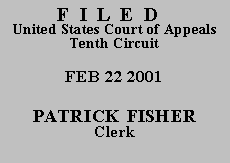

| ALI MEHDIPOUR,
v.
CHARLES CHAPEL, Judge; RETA
M. STRUBHAR, Judge; GARY L.
LUMPKIN, Judge; CHARLES |
|
Before BRORBY, KELLY, and
MURPHY, Circuit Judges.
After examining the briefs and appellate record, this panel has determined
unanimously that oral argument would not materially assist the determination of
this appeal. See Fed. R. App. P. 34(a)(2); 10th Cir. R. 34.1(G). The case is
therefore ordered submitted without oral argument.
Appellant Ali Mehdipour, appearing pro se, appeals the district court's decision dismissing his civil rights complaint filed pursuant to 42 U.S.C. § 1983. We exercise our jurisdiction under 28 U.S.C. § 1291 and affirm.
In his § 1983 complaint, Mr. Mehdipour sought declaratory judgment and injunctive relief against several judges on the Oklahoma Court of Criminal Appeals.(1)
Mr. Mehdipour claimed these judges violated his constitutional rights by denying his motions in his ongoing state criminal case to terminate his attorney's services, strike his attorney's brief, and proceed pro se on direct appeal. In a thorough and well-reasoned decision, the federal district court dismissed Mr. Mehdipour's complaint, determining it lacked jurisdiction to review Mr. Mehdipour's request for declaratory judgment and injunctive relief against the named state judges. Specifically, the district court held it lacked jurisdiction under the Rooker-Feldman doctrine(2)
to review the Oklahoma Court of Criminal Appeals' final decision on Mr. Mehdipour's motions.(3)
Even if Mr. Mehdipour did not seek review of a final state court decision, the district court concluded it must abstain from exercising jurisdiction over Mr. Mehdipour's declaratory and injunctive claims in an ongoing state proceeding, pursuant to Younger v. Harris, 401 U.S. 37 (1971).
On appeal, Mr. Mehdipour argues the district courted erred in not: 1) exercising jurisdiction over his § 1983 complaint; 2) considering his supplemental complaint alleging bad faith and harassment; and 3) granting a temporary restraining order or preliminary injunction. (Apt. Br. at 1, 7, 12.) We review de novo the district court's dismissal of a § 1983 complaint under the Rooker-Feldman doctrine for lack of subject matter jurisdiction. See Kiowa Indian Tribe of Oklahoma v. Hoover, 150 F.3d 1163, 1165 (10th Cir. 1998). Similarly, we review de novo the district court's abstention from exercising jurisdiction under Younger. See J.B. ex rel. Hart v. Valdez, 186 F.3d 1280, 1291 (10th Cir. 1999). Under Younger, "a federal court should not enjoin a pending state criminal proceeding unless an injunction is necessary to prevent great and immediate irreparable injury." Id.
After a careful review of the entire record, we conclude the district court did not err in dismissing Mr. Mehdipour's § 1983 complaint for lack of jurisdiction, in failing to consider his supplemental complaint for the same reason, or alternatively, in abstaining from exercising jurisdiction. Moreover, we conclude Mr. Mehdipour has not shown great and immediate irreparable injury, as necessary for an injunction, will result from the district court's abstention from exercising jurisdiction in this case. Thus, for substantially the same reasons set forth by the district court in its July 24, 2000 Order of Dismissal, we DISMISS Mr. Mehdipour's appeal.
Entered by the Court:
WADE BRORBY
United States Circuit Judge
*. This order and judgment is not binding precedent except under the doctrines of law of the case, res judicata and collateral estoppel. The court generally disfavors the citation of orders and judgments; nevertheless, an order and judgment may be cited under the terms and conditions of 10th Cir. R. 36.3.
1. As background, we note Mr. Mehdipour has a long history of unsuccessful appeals to this court, including another civil rights action against several other defendants, a § 2254 petition, various motions under Fed. R. Civ. P. 59(e) and 60(b), and a motion to enjoin an ongoing Oklahoma court criminal prosecution. See, e.g., Mehdipour v. City of Oklahoma City, 173 F.3d 864, 1999 WL 114378 (10th Cir. Mar. 5, 1999) (unpublished op.) (Rule 60(b) motion); Mehdipour v. Snowden, 162 F.3d 1173, 1998 WL 777397 (10th Cir. Nov. 4, 1998) (unpublished op.) (motion to enjoin); Mehdipour v. City of Oklahoma City, 161 F.3d 18, 1998 WL 694527 (10th Cir. Oct. 6, 1998) (unpublished op.) (Rule 60(b) motion); Mehdipour v. Oklahoma County Sheriff, 161 F.3d 18, 1998 WL 614448 (10th Cir. Sept. 4, 1998) (unpublished op.) (28 U.S.C. § 2254 petition); Mehdipour v. City of Oklahoma City, 145 F.3d 1346, 1998 WL 199648 (10th Cir. April 24, 1998) (unpublished op.) (Rules 59(e) and 60(b) motions); Mehdipour v. City of Oklahoma City, 131 F.3d 152, 1997 WL 748651 (10th Cir. Dec. 3, 1997) (unpublished op.) (civil rights action).
2. See, e.g., District of Columbia Court of Appeals v. Feldman, 460 U.S. 462, 486 (1983) (holding federal district courts "do not have jurisdiction ... over challenges to state court decisions in particular cases arising out of judicial proceedings even if those challenges allege that the state court's action was unconstitutional. Review of those decisions may be had only in this [United States Supreme] Court."); Rooker v. Fidelity Trust Co., 263 U.S. 413, 414-16 (1923) (explaining that under the legislation of Congress, no court of the United States other than the United States Supreme Court could entertain a proceeding under a bill of equity to reverse or modify a judgment affirmed by the state supreme court).
3. While the Oklahoma state judges named as defendants in this case raised the defense of absolute immunity, the district court noted Mr. Mehdipour did not seek damages against them, but instead requested declaratory and injunctive relief which judicial immunity does not always bar.